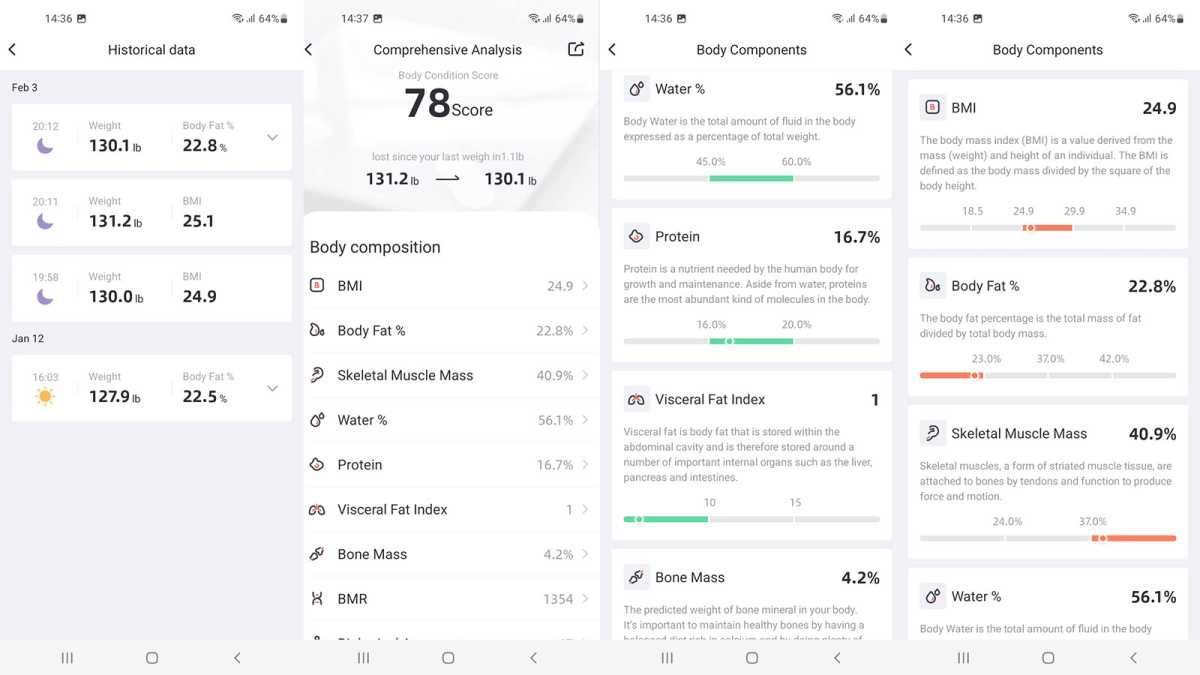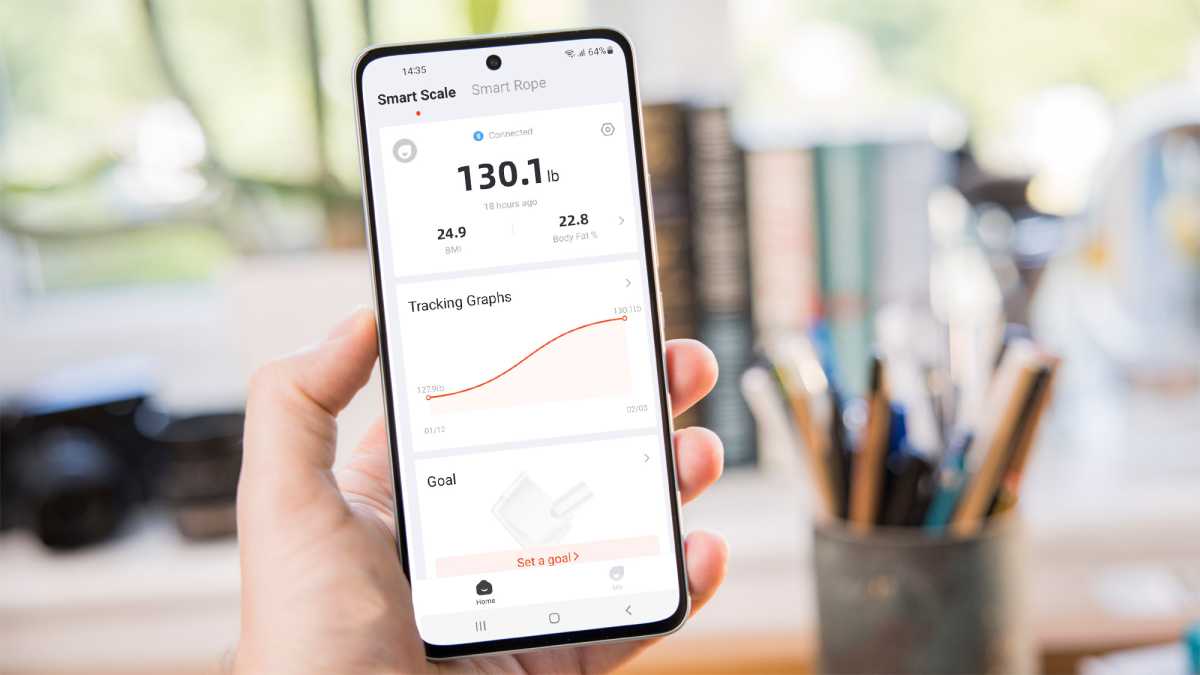Expert’s Rating
Pros
- USB-C charging
- Compatible with Google Fit, Fitbit, Samsung Health, and Apple Health
- 13 measurements
- Larger sized scale
Cons
- Only tracks weight and body fat percentage over time
- No heart rate measurement
- No Wi-Fi connection
Our Verdict
The Yunmai Smart scale 3 is a simple, easy-to-use option for people beginning a fitness journey. It’s larger than some competing scales, will show your weight and body fat % on the device itself, and it won’t make you feel bad with critical in-app metric labels.
If you’re thinking about buying a smart scale, you might be beginning a fitness journey or hoping to see some small changes as you start good habits. If that’s the case, you don’t need to spend hundreds on the latest feature-crammed smart scale. Something reliable, straightforward and easy to use should fit the bill.
Yunmai is a smart home health brand under the Xiaomi aegis. The Smart Scale 3 is one of its more budget-friendly models. It offers all the basics and does them well.
Smart Scale 3 design
White, glossy and minimalist, the Yunmai Smart Scale 3 has a simple design. The scale has a slightly larger surface than many similar devices at 30 x 30cm. Underneath, it has four large, non-slip feet and the white plastic of the base wraps around to form a protective trim around the glass that’ll prevent chips and cracks. It can accurately weigh to up to 150kg/ 330lbs.
There are four large metal diodes at each corner, just over two inches in diameter (55mm), that deliver the Bioelectrical Impedance Analysis (BIA) current.
When you stand on the scale with bare feet, it sends a mild, painless current of electricity through your body and measures your body’s resistance. Like all smart scales, it’s safe to use, but if you have a pacemaker or any other kind of medical implant, you should consult your doctor first.
Unlike many rival apps that use critical tags to judge body composition (excellent, good, bad), the Yunmai app avoids any stark labelling.
The Yunmai 3 has a 600mAh lithium battery and one full charge will last for up to 75 days. It charges via USB-C, which is a useful feature, as the usual alternative is disposable batteries, which are just another thing to remember to buy and replace.
Other charging options are rare, although we have reviewed the Renpho Elis Solar Scale, which charges by either sunlight or artificial light. It’s a budget-friendly buy as well.
The Yunmai 3 provides 13 metrics: weight, BMI, body-fat percentage, skeletal muscle mass, water, protein, visceral fat index, bone mass, BMR, biological age, fat weight, body fat mass index, and fat-free mass.
BIA is a popular method of estimating body composition, but do remember that the figures and percentages it generates are estimates: sex, age, height, and ethnicity can affect reliability. Think of it as a guide that can show you, over weeks or months of use, whether or not you’re heading in the right direction.
Setting up the Smart Scale 3
In the box, there’s a scale, a USB cable, and a manual. A power adapter is not included, so you will need to obtain one separately, but a typical adapter for a smart phone or tablet will suffice.
The first step is to charge the scale. While you’re doing so, you can install the Yunmai app either through the supplied QR code in the manual or by downloading it from Google Play or the Apple Store. It’s free to use and you’ll be able to export data to Google Fit and Fitbit, and sync with Samsung Health and Apple Health.
Set up your Yunmai account by registering in the app with an email address and password, and entering your name, age and height. You then connect the scale via Bluetooth to the app.
We found this took a couple of tries. The scale must be switched on at the back, then you’ll need to stand on it and the device will connect.
Using the scale
Whenever you stand on the scale, the display will illuminate and show your weight in pounds or kilograms. Use it barefoot and it will also show your body-fat percentage. The scale will then automatically send your results to the app via Bluetooth, where a wider set of metrics will be generated.
You’ll be sent a push notification when you weigh in. You then allocate the weigh-in data to a profile in the app. We found it to be a straightforward system.
The Yunmai 3 does not allow unlimited users, but you can add up to 16 profiles for family members, and you can also set weighing reminders via push notifications to your phone.
The app is simple and easy to navigate. Weight, BMI and body-fat percentage are displayed at the top of the home screen, alongside a settings icon that allows you to change the measuring unit; you can only choose between pounds or kilograms.
Beyond the three key metrics, you can access a second screen that details all the other body-composition measurements. Unlike many rival apps that use critical tags to judge body composition (excellent, good, bad, etc.), the Yunmai app avoids any stark labelling.

Foundry
Instead, there’s a slider chart that shows whether a metric falls into a green or red zone: a gentler way to show how you could improve your fitness. For this reason, we think that people with a significant amount of weight to gain or lose may find this scale more supportive of their journey.
We found the Yunmai’s metrics to be accurate, although our testing isn’t perfect; all we can do is compare its results with other smart scales. Interestingly, of several brands we have tested, it’s the only system that produced a body age metric that matched the actual biological age of our testers, whose body composition falls within normal boundaries.
You can also track your weight and body-fat percentage over a week, month or year. Some competing models will give you much more in-depth trend analysis, so this isn’t a great option for a bodybuilder who wants to track their muscle mass. Nor will you get heart rate or heart health information. You can, however, set a weight goal.

Dominik Tomaszewski / Foundry
You can also weigh pets, babies, and even small objects. As you can probably guess, all metrics beyond weight are for adults only. For children (and, of course, pets) this is a simple weighing scale.
For those who exercise seriously, there’s an athlete mode that may give you more accurate results, although we don’t think this device offers enough in-depth analysis to be a great fit for athletes.
When it’s time to charge the scale, a power indicator icon on the illuminated display of the scale will light up.
If you’ve never used a smart scale, you may well need to refer to the manual. Unfortunately, the one that comes with the Yunmai Smart Scale 3 is printed in a tiny typeface that may not be easy for everyone to read.
Should you buy the Yunmai Smart Scale 3?
Yunmai’s slogan is “Simplify your workout,” and that’s exactly what the Smart Scale 3 does. It’s not complicated to use, and it provides gentle feedback. It won’t overwhelm you with data or tell you, in big red letters, that your body fat levels mean you’re obese.
It’s easy to use as well, playing nicely with other fitness apps and its Bluetooth-delivery of weigh-in info is user friendly. But ultimately, the app features and trend information are limited. If, for example, you’re looking to track your muscle mass as you bulk up, it’s not the smart scale for you.
If you’re looking for a smart scale that delivers more detailed measurements, check out our review of the Eufy Smart Scale P2 Pro.




